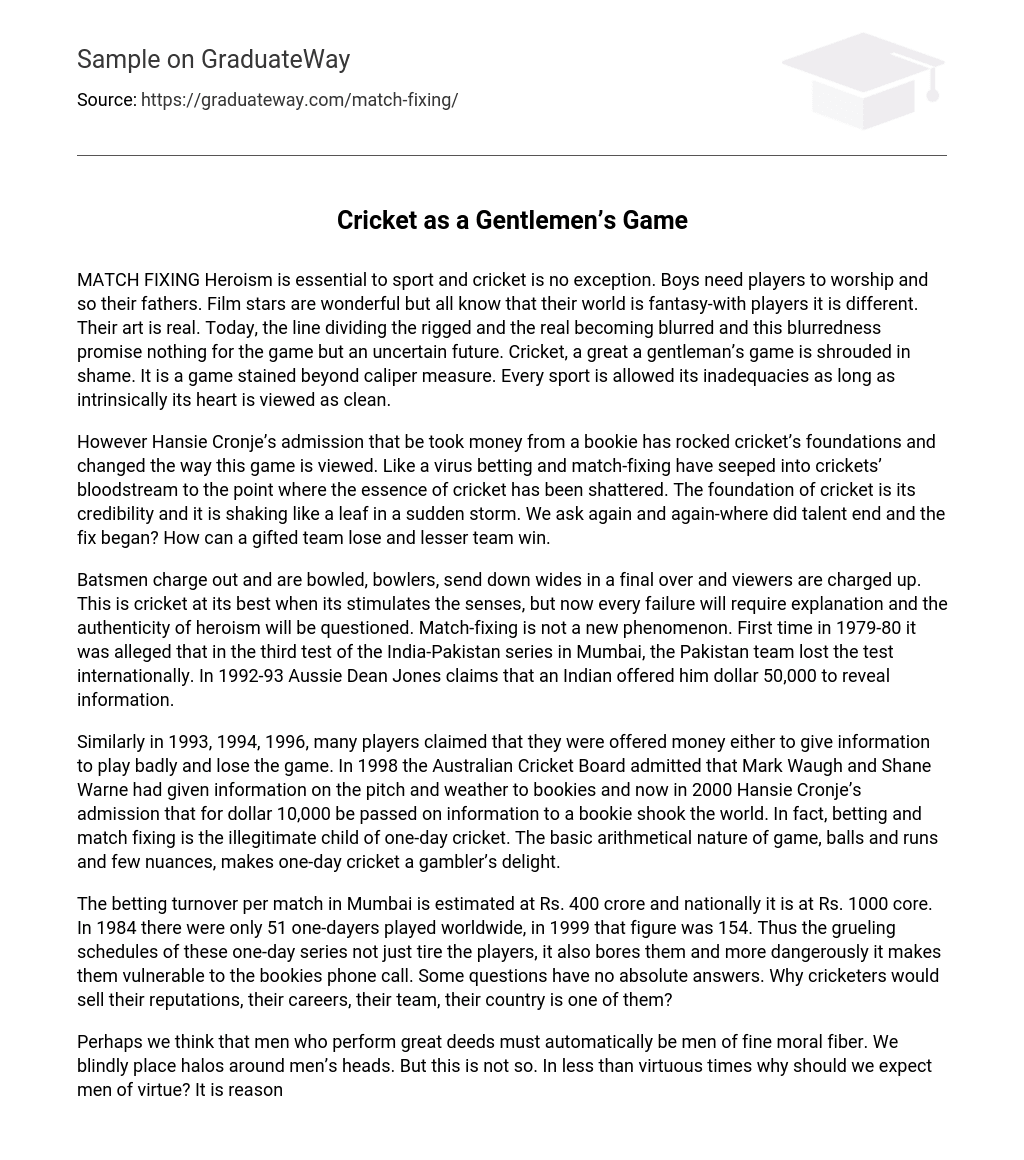MATCH FIXING
The importance of heroism in sports, specifically cricket, cannot be overstated. It is essential for both young boys and their fathers to have admirable figures to admire. Although movie stars can be captivating, it is widely recognized that their world is built on fantasy. Conversely, athletes possess genuine talent. However, the line between reality and manipulation has become increasingly blurred lately. This lack of clarity poses a significant danger to the future of the game. Cricket, renowned for its gentlemanly conduct, has now been tarnished with immeasurable disgrace. Despite any flaws it may have, every sport must uphold its core values as pure.
Hansie Cronje’s admission of accepting money from a bookmaker has severely damaged cricket’s principles and altered its perception. Betting and match-fixing have spread throughout cricket to such an extent that the fundamental nature of the sport has been shattered. The credibility that lies at the core of cricket is now trembling like a leaf in an unexpected storm. The question persists, where does skill end and corruption begin? How can a talented team lose while a lesser team emerges victorious?
In an exciting final over, batsmen eagerly rush out only to be bowled, while bowlers sometimes bowl wides. This truly demonstrates the essence of cricket that excites and stimulates viewers’ senses. However, in today’s context, every failure on the field necessitates a detailed explanation, causing doubts about the authenticity of remarkable performances. The issue of match-fixing is not a recent occurrence.
During the third test of India-Pakistan series in Mumbai in 1979-80, allegations arose suggesting that the Pakistan team intentionally lost the match. Additionally, in 1992-93, Australian cricketer Dean Jones revealed that he was offered $50,000 by an Indian individual in exchange for sharing information.
Throughout the years, there have been various incidents in which players have been paid to provide information or intentionally perform poorly in matches. These instances occurred in 1993, 1994, and 1996. In a notable case dating back to 1998, the Australian Cricket Board openly acknowledged that Mark Waugh and Shane Warne had disclosed pitch and weather details to bookies. Additionally, a significant event unfolded in 2000 when Hansie Cronje confessed to sharing information with a bookie in exchange for $10,000. Undoubtedly, these occurrences have had a profound impact on the cricket world. As a result of its essential components such as balls, runs, and intricate details that make it highly appealing to gamblers, one-day cricket has become strongly associated with betting and match fixing.
The betting turnover per match in Mumbai is estimated at ₹400 crore and nationally it is at ₹1000 core. From 1984 to 1999, the number of one-dayers played worldwide increased from 51 to 154. Hence, the busy schedules of these one-day series not only exhaust the players but also bore them. Moreover, it makes them vulnerable to phone calls from bookies. There are certain unanswered questions, including why cricketers would risk their reputations, careers, teams, and countries by participating in such activities.
It is often assumed that men who achieve great things must also possess strong moral values, but this is not always the case. We tend to idealize and assign virtuous qualities to men unknowingly. However, there are instances where morality is absent, and we cannot expect men to embody virtue in such circumstances. This concern extends to the realm of cricket as well. Additionally, the sport is heavily influenced by finances, with not all funds being acquired ethically. Cricketers are ordinary individuals with their own desires, and greed is a universal human characteristic that surpasses race, religion, and ethnicity. Unfortunately, even those responsible for administering cricket share responsibility for this unfortunate reality.
It has been caught napping multiple times, similar to how the International Olympic ability overlooks drug-taking. Cricket officials have neglected to address match fixing, hoping it will disappear. In Pakistan, Justice Malik Muhammad Qayyum’s report on match fixing, completed in October, remains unused and potentially explosive. Similarly, Justice Y. V. Chandrachudas’ 94-page document on betting and match fixing in India is being kept hidden.
The Australian Cricket Board faced public criticism for their secretive handling of a potentially explosive incident. In February 1995, Mark Waugh and Shane Warne shocked the Australian cricket establishment by confessing that they had received payments of $4,000 and $8,000 respectively for sharing information. While Waugh was fined $10,000 and Warne $8,080, the board opted to keep the matter under wraps. Additionally, many felt that the fines imposed on the cricketers were too lenient given the magnitude of their betrayal.
The ICC is often seen as ineffective and lacking authority because each board is not willing to give up their control, making the idea of a “world body” meaningless. However, it is important for players to take responsibility for monitoring themselves. As stated by the ICC Code of Conduct Commission, players must inform their team manager or captain if approached by bookmakers, and failing to do so should be punished.
For the players, it is important to prevent any tarnishing of their sport, as even those who are honest will face suspicion in a corrupted game. According to the Chandrachud report, if the general public, who have always supported and taken pride in the game, start believing that bookies rather than the chosen players determine the outcome, it will be a regrettable day. Regrettably, that day has already arrived. The biggest challenge for officials now is to regain the public’s trust and restore the sport’s credibility. The only hope lies in the fact that cricket has withstood many challenges throughout time and is a resilient sport that will also surmount this crisis. We also wish a successful future for this traditional game of gentlemen.





